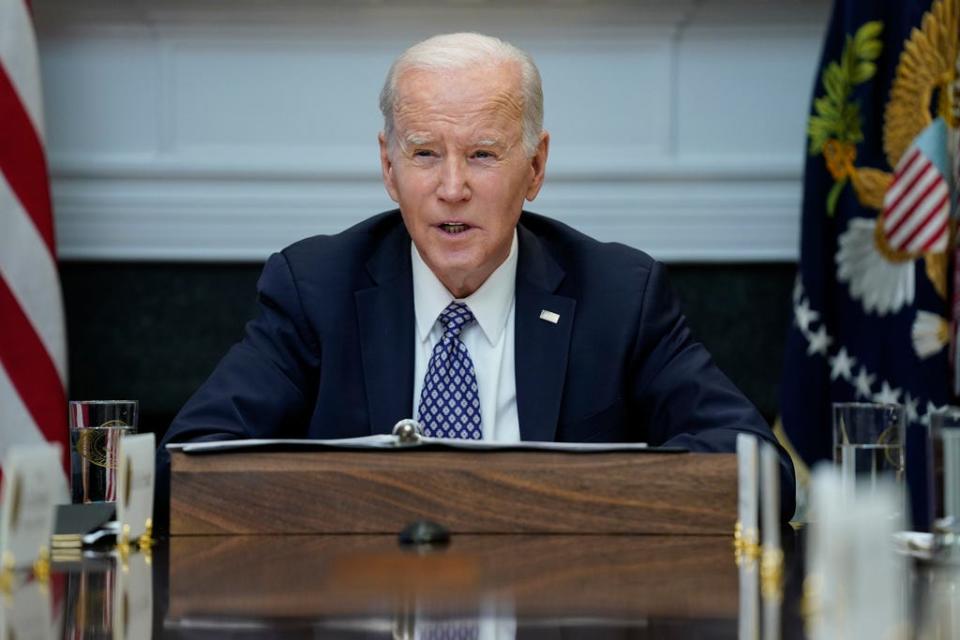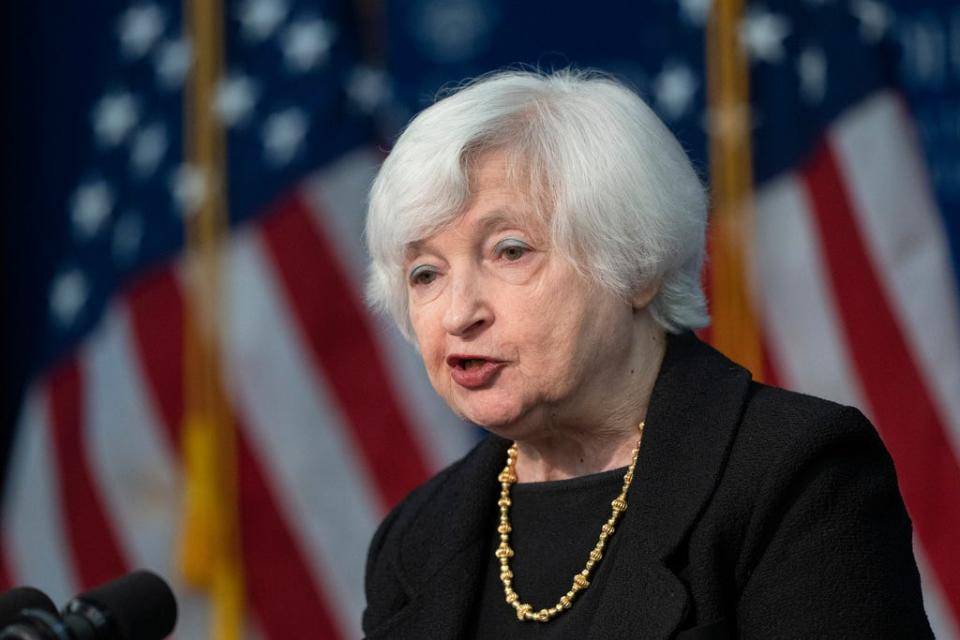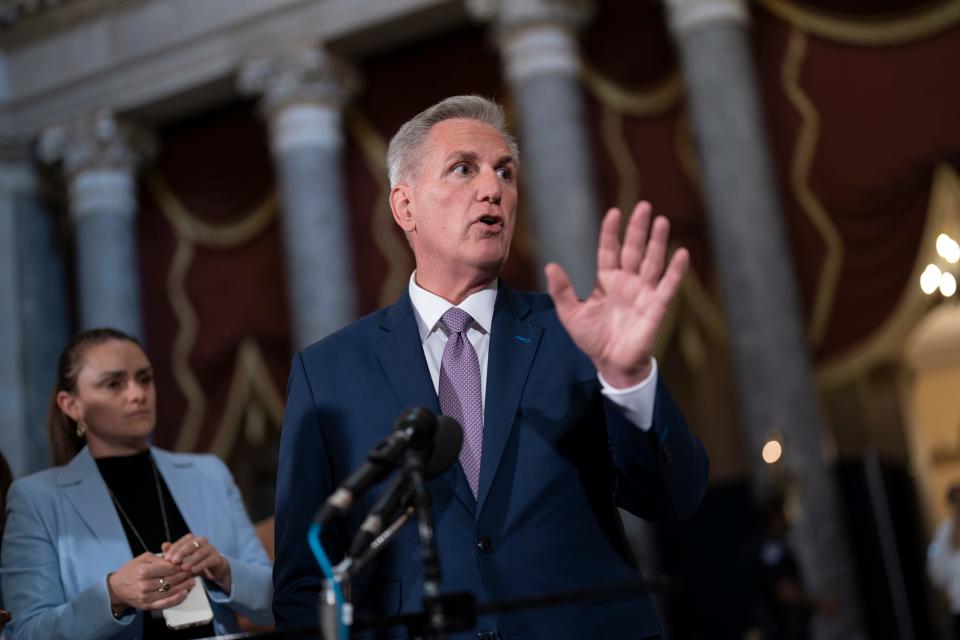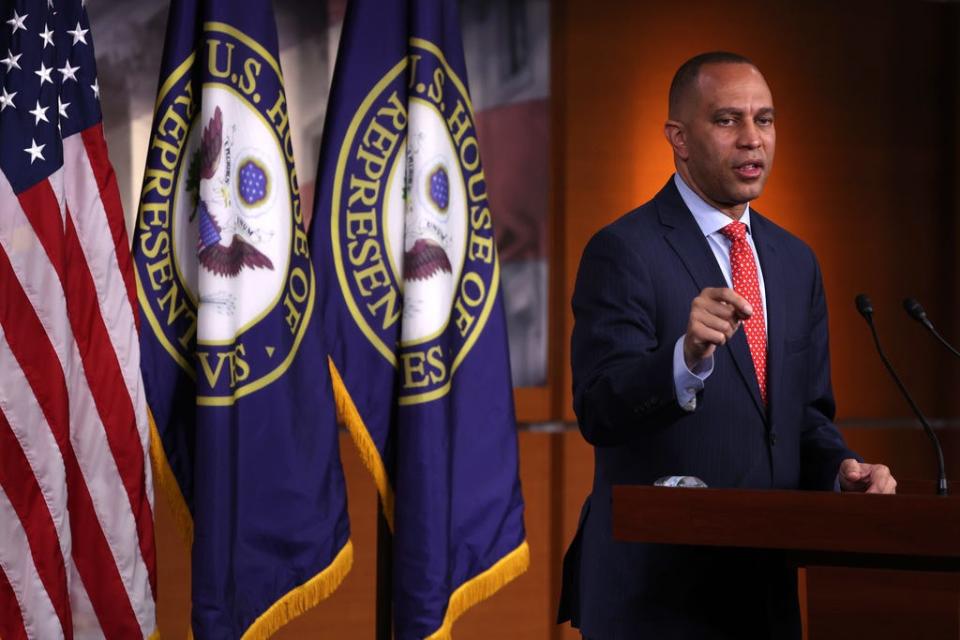Can Biden declare the debt ceiling unconstitutional? The 14th Amendment explained
- Oops!Something went wrong.Please try again later.
As brinksmanship over the debt ceiling continues and the U.S. barrels towards defaulting on its debts as early as June 1, some legal experts have advocated for alternative and unprecedented solutions to ensure the government could continue paying its bills, including invoking the 14th Amendment.
Some officials in the White House are discussing the prospect of essentially declaring the debt ceiling as unconstitutional, the New York Times reports.
It is unclear whether the White House would proceed with such a move if the U.S. gets closer to June 1 without hard progress on the current debt ceiling negotiations. Invoking the 14th Amendment would almost certainly invite legal challenges which could start a separate fight on the debt ceiling.
Stay in the conversation on politics Sign up for the OnPolitics newsletter

What is the 14th Amendment?
The theory takes aim at Section Four of the 14th Amendment which states the “validity of the public debt of the United States, authorized by law, including debts incurred for payment of pensions and bounties for services in suppressing insurrection or rebellion, shall not be questioned.”
The idea, the theory's proponents argue, is that it would be unconstitutional for the government to stop paying its debts.
During a separate debt ceiling standoff during the Obama administration in 2011, former President Bill Clinton told the National Memo if he were president at the time, he would invoke the 14th Amendment “without hesitation and force the courts to stop me.”
But Treasury Secretary Janet Yellen has made clear she thinks Congress is the only institution with the authority to raise the debt ceiling and ensure the government could continue paying its debts. Yellen specifically dismissed the 14th Amendment as a solution to the debt ceiling standoff in 2021.
“We shouldn’t be in a position where we need to consider whether or not the 14th Amendment applies. That’s a disastrous situation that the country shouldn’t be in,” Yellen said on ABC’s “This Week.”
Related: House Dems move forward with secret plan to pay America's bills.

Legal scholars are mixed on 14th Amendment and the debt ceiling
The theory’s proponents say the 14th Amendment’s language makes clear that any steps must be taken to prevent a default, as not doing so otherwise would be unconstitutional.
“Section Four does impose a constitutional mandate that is directly relevant to today’s debt ceiling crisis,” Rebecca Zietlow, a professor of constitutional law at the University of Toledo, wrote Thursday in Jurist.
But opponents to the theory argue the Constitution only grants Congress the power to borrow money and the White House does not have unilateral power to raise the debt ceiling on its own.
“Nothing in the 14th Amendment or in any other constitutional provision suggests that the president may usurp legislative power to prevent a violation of the Constitution,” Laurence Tribe, professor emeritus at Harvard Law School and constitutional law scholar wrote in a New York Times op-ed in 2011.

White House and top Congress leaders set to meet on debt ceiling
The top congressional leaders in both parties, House Speaker Kevin McCarthy, R-Calif., House Minority Leader Hakeem Jeffries, D-N.Y., Senate Majority Leader Chuck Schumer, D-N.Y., and Senate Minority Leader Mitch McConnell, R-Ky., are slated to meet with President Joe Biden on May 9 to discuss raising the debt ceiling after Yellen announced the government could run out of cash to continue paying its debts as early as June 1.
It is unclear how negotiations could proceed as both sides remain miles apart on their positions. McCarthy has pledged to only raise the debt ceiling in exchange for spending cuts and McConnell has said negotiations should remain between the White House and the GOP-controlled House. Biden and top Democrats have called for a clean debt ceiling increase without spending cuts attached while maintaining they are open to separate budget discussions.
Opinion: The heart of the debt ceiling crisis? MAGA and Marjorie Taylor Greene.

This article originally appeared on USA TODAY: 14th Amendment: Can Biden declare the debt ceiling unconstitutional?

